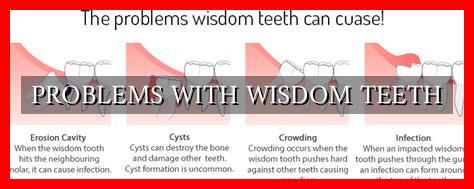-
Table of Contents
Problems with Wisdom Teeth
Wisdom teeth, also known as third molars, are the last set of molars to emerge in the back of the mouth. While they can be beneficial if they erupt properly and align with the rest of the teeth, they often cause problems due to their late arrival and limited space in the mouth. In this article, we will explore the common issues associated with wisdom teeth and the potential solutions to alleviate these problems.
Impacted Wisdom Teeth
One of the most common problems with wisdom teeth is impaction, where the teeth do not have enough room to emerge properly through the gums. This can lead to various issues such as:
- Pain and discomfort
- Infection
- Damage to surrounding teeth
- Cysts or tumors
Impacted wisdom teeth often require extraction to prevent further complications. According to the American Association of Oral and Maxillofacial Surgeons, about 85% of wisdom teeth will eventually need to be removed.
Overcrowding
Another problem that wisdom teeth can cause is overcrowding in the mouth.
. When there is not enough space for the wisdom teeth to erupt properly, they can push against the adjacent teeth, causing misalignment and crowding. This can lead to:
- Tooth decay
- Gum disease
- Difficulty in cleaning between teeth
Orthodontic treatment may be necessary to address the overcrowding issue caused by wisdom teeth.
Pericoronitis
Pericoronitis is a condition where the gum tissue around a partially erupted wisdom tooth becomes inflamed and infected. This can result in symptoms such as:
- Swelling
- Pain
- Difficulty opening the mouth
Antibiotics and proper oral hygiene may help alleviate the symptoms of pericoronitis, but in severe cases, extraction of the wisdom tooth may be necessary.
Summary
Wisdom teeth can be a source of various problems, including impaction, overcrowding, and pericoronitis. It is essential to monitor the development of wisdom teeth through regular dental check-ups and X-rays to address any potential issues early on. If problems arise, it is crucial to consult with a dentist or oral surgeon to determine the best course of action, which may include extraction or orthodontic treatment.
By understanding the potential problems associated with wisdom teeth and taking proactive measures, individuals can maintain their oral health and prevent complications in the future.





